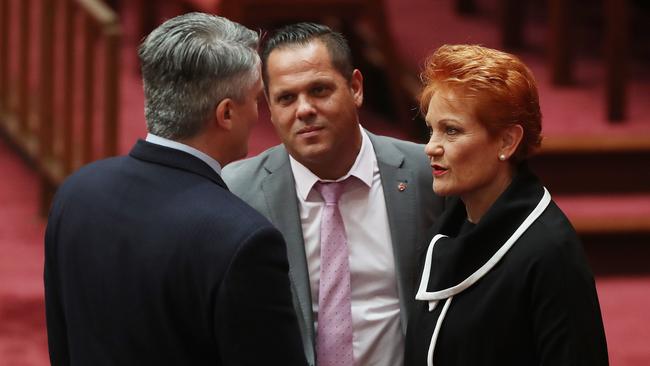Turnbull government dumps company tax cuts after Senate defeat
Malcolm Turnbull’s government will not take their signature tax cut proposals for big business to the next election.

The Turnbull government has removed a barnacle, announcing it will not take the big business company tax cuts to the next election and conceding there was no consensus for a lower tax rate.
Instead, Malcolm Turnbull, Scott Morrison and Finance Minister Mathias Cormann will focus on accelerating the rollout of existing tax cuts for small and medium companies with an annual turnover of up to $50 million.
As it stands, these businesses pay a 27.5 per cent tax rate and were not due to receive the lower 25 per cent tax rate until 2026-27.
“We are going to review our enterprise tax plan in so far as it applies to small and medium businesses and focus on how we can provide enhanced support, or perhaps an acceleration of the tax cuts for the small and medium businesses,” Prime Minister Malcolm Turnbull said.
Under pressure over rising energy costs, Mr Turnbull also revealed the government would not repeal the energy supplement for pensioners as planned.
The energy supplement - $14.10 per fortnight for singles and $10.60 per fortnight for a married couple - was introduced by Labor as compensation for the carbon tax, which was later abolished by the Abbott government.
The Prime Minister said the backflip on the energy supplement had not been a “rash decision” and the cost of keeping it would have no adverse budget impact because it was provided for in the contingency reserve.
Senator Cormann said big business “needs to do the work” to convince Australians of the importance of their contribution to the country’s economic security, prosperity and success.
“Nobody in the Senate would question that we did everything that we could to secure the passage of that legislation [to lower the tax rate to 25 per cent for larger businesses]. We truly left no stone unturned,” he said.
“I’m personally disappointed that we failed to secure the necessary support, but it is of course now important to pragmatically take stock of where we are and to make judgements about the best direction into the future.
“Our commitment remains unchanged. We want to ensure that working families around Australia have the best possible opportunity to get ahead.”
Mr Turnbull’s announcement will come as a relief to a number of Coalition MPs, who have urged the government to drop the big business tax cuts and turn its focus to energy prices and small and medium businesses.
Company tax cuts defeated
The announcements came after the government’s remaining company tax cuts for big business — a key plank of its signature enterprise tax plan — had been defeated in the Senate.
One Nation, Centre Alliance, Victorian Derryn Hinch and South Australian Tim Storer sided with Labor and the Greens to reject the tax cuts for businesses with an annual turnover of more than $50 million.
The bill to legislate the big business tax cuts did not get to a third reading vote but 36 senators, including the key Senate crossbenchers, voted against it proceeding in its current form.
Senator Cormann could have called for a third reading debate but did not.
Crossbenchers David Leyonhjelm, Brian Burston, Fraser Anning and Cory Bernardi sided with the Coalition.
Australian Industry Group chief executive Innes Willox said business was partly to blame for the Senate’s rejection of the remaining company tax cuts.
“We need to create much greater recognition of the links between business success, employment growth and improved opportunities and living standards,” he said.
“Our failure to make these links has been a significant part of the lack of parliamentary support for the remainder of the enterprise tax plan.”
The withdrawal of the company tax cuts from the government’s policy platform following the Senate’s vote was a “major setback” for Australian competitiveness and future living standards, Mr Willox said.
KPMG tax partner Grant Wardell-Johnson said today’s outcome left “very little room” to find other “sound” policy options to drive productivity and growth.
PricewaterhouseCoopers Australian tax leader Pete Calleja said Australia would remain at the very bottom of all OECD countries in attracting economic investment from local and foreign sources.
The big business tax cuts policy would have cost the government $35.6 billion over 10 years.
Tax cuts for businesses with an annual turnover of up to $50m passed the Senate last year following a side deal with the Nick Xenophon Team.
Those businesses have a 27.5 per cent tax rate now and this will gradually reduce to 25 per cent in 2026-27.
Cabinet will consider whether to speed up the rollout of those tax cuts — a move which has popular support within the Coalition and Senate crossbench.
The tax rate for companies with an annual turnover above $50m will stay at 30 per cent.
Senator Storer said he was pleased more senators had accepted the budget was in no shape to take a $36bn hit and that taxpayers’ money would be better allocated elsewhere.
“It is a vindication, too, of the view of the voters in the Super Saturday by-elections, in Mayo in my home state of South Australia, in Longman, Braddon, Fremantle and Perth,” he said.
“The voters have made it clear that they would prefer precious taxpayers’ money to be allocated to get the quality of services they expect, more nurses, more teachers and improved infrastructure to make it easier to get to work and do the shopping, as well as to support R&D, advanced manufacturing and to build the jobs of tomorrow.”
The Greens said the defeat was a “victory for civil society over corporate interests”.
“A cut to corporate tax would undoubtedly lead to cuts to the social safety net and public services for all Australians,” Greens treasury spokesman Peter Whish-Wilson said.



